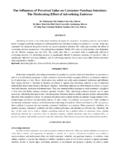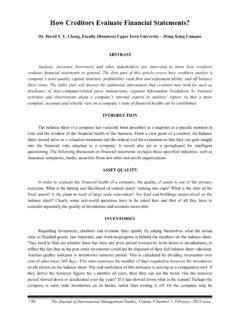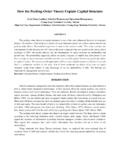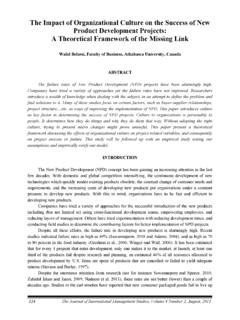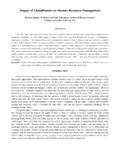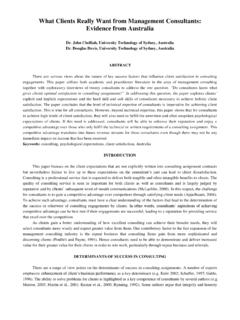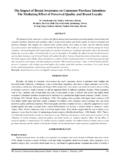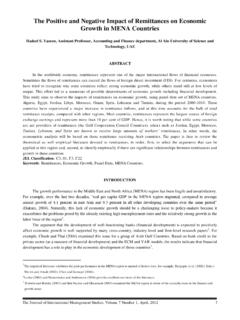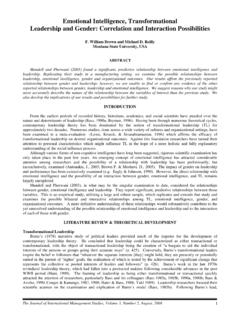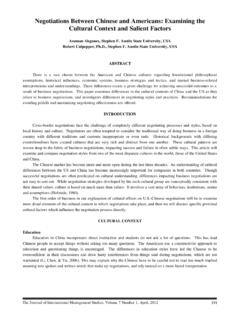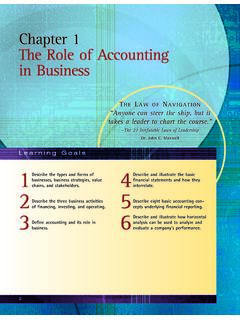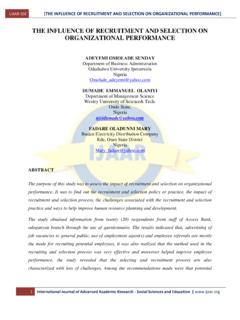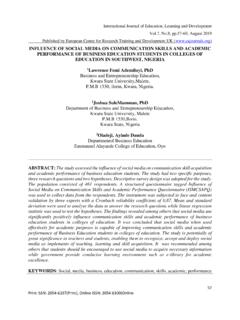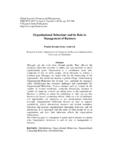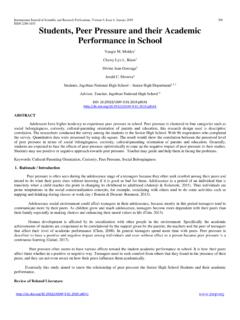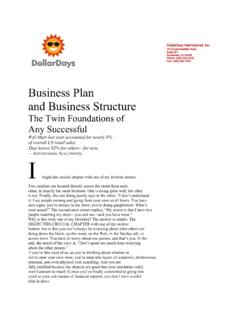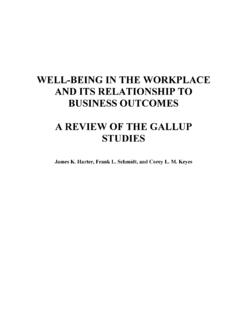Transcription of Korean Culture And Its Influence on Business Practice in ...
1 The Journal of International Management Studies, Volume 7, Number 2, October, 2012184 Korean Culture And Its Influence on Business Practice in South Korea Choong Y. Lee, Pittsburg State University, Kansas, ABSTRACT Different countries have different cultures from the Influence of its religions, custom, norms and tradition. South Korea has its unique cultures and these cultures Influence people s daily life as well as its Business practices, especially in international Business . It is essential for foreigners or multinational companies in South Korea to understand those cultures and use them appropriately to work better with Korean employees or partners.
2 This paper mainly focuses on six parts of the Korean Culture , which are Kibun, Inhwa, the power distance and hierarchy, Confucianism, the personal relationships in doing Business , and Business etiquette in Korea. All of these critical aspects of the Korean Culture have strong influences on the way how to do Business in South Korea. Without understanding them, it is hard especially for foreigners and foreign companies to do their Business in Korea effectively and efficiently and have all successes in their Business in Korea.
3 Keywords: Korean Culture , Hofstede Cultural Dimension, Confucianism, Korean Business Etiquette, K-Type Management INTRODUCTION South Korea, with the official name of Republic of Korea (ROK), is located in East Asia. It has nine provinces and six special cities, with the population of approximately 50 million. It has long history, and even though it has interactions with China and Japan for a long time, it generated its unique Culture and developed its own tradition. Indeed, the Korean Culture is very different from not only Western cultures, but also neighboring countries cultures in every aspect of Culture .
4 Even though some components of the Culture are similar to Chinese and Japanese ones, cultural differences make the way to do Business in Korea different from other countries, especially from China or Japan. This is the reason why this paper will examine some of major aspects of unique Korean cultures which give significant impact on doing Business in Korea. Specifically, this paper will focus on six critical aspects of Korean Culture , including Kibun, Inhwa, the power distance/hierarchy, Confucianism, the personal relationships in doing Business and Business etiquette in Korea.
5 Although there are more cultural aspects that Influence its Business practices in Korea, those six items of Korean Culture are the most important ones regarding doing Business in Korea by foreigners or multinational companies. CRITICAL ASPECTS OF Korean Culture FOR Business PRACTICES IN KOREA Kibun As one of the most important key aspect of the Korean Culture , which influences the way to do Business in South Korea significantly, Kibun does not have direct English translation. It basically means a mood or feeling of balance and good behavior (Chaney and Martin, 2011).
6 In South Korea, people are continuously trying to maintain the environment of stable Kibun, both in personal life and Business world. People are willing to maintain their own Kibun as well as others . It is not polite to disturb others Kibun. For this aspect of Korean Culture , it is much about the feelings of others (Southerton, 2008). People tend to do things with the respect of others opinions and feelings, and sometime avoid saying no or bad news, to prevent hurting others Kibun.
7 Knowing this Culture is very important to maintain the harmony, and especially in the Business world. In the Business world, Korean people always make an attempt to be polite, friendly, and do things with only the best of intentions. They do not want to lose others face by criticizing them The Journal of International Management Studies, Volume 7 Number 2, October, 2012 185 in public. In Business , a manager s Kibun is damaged if his subordinates do not show proper respect. A subordinate s Kibun is damaged if his/her manager criticizes him/her in public (Southerton, 2008).
8 Therefore, it is very likely that Korean people would show their different opinions or feelings by giving positive or ambiguous answers. People need to read from their non-verbal or body languages to understand the actual meaning of the answers. It is common for Korean people to understand each other; however, it is very easy to cause misunderstanding and/or confusing to foreigners. For example, Americans usually like to do Business directly. They present their opinions and feelings by giving direct and clear answers.
9 Sometime, they even seem argumentative to those who are from other countries. In this case, there is a very high chance that Americans would hurt Koreans Kibun, and thus, it is hard for the two parties to achieve agreement on Business . Therefore, it is very important for foreigners, like Americans, to understand the Culture of Kibun, and be prepared and Practice picking up their non-verbal and body languages to know the actual meaning. On the other hand, Americans should try to avoid too argumentative or aggressive when doing even small Business with South Koreans.
10 In South Korea, the way of paying attention to others non-verbal and body languages, as well as the tones of what they say is Nunchi. The translation of Nunchi is eye measure. In other words, Nunchi is the ability to determine another person s Kibun by using the eye (Southerton, 2008). As mentioned above, people need to learn from others non-verbal and body languages, as well as the tones to get the real meaning of what they said. Nunchi is like a sixth sense, but it is more looking at visual clues and understanding what the person is really saying.
